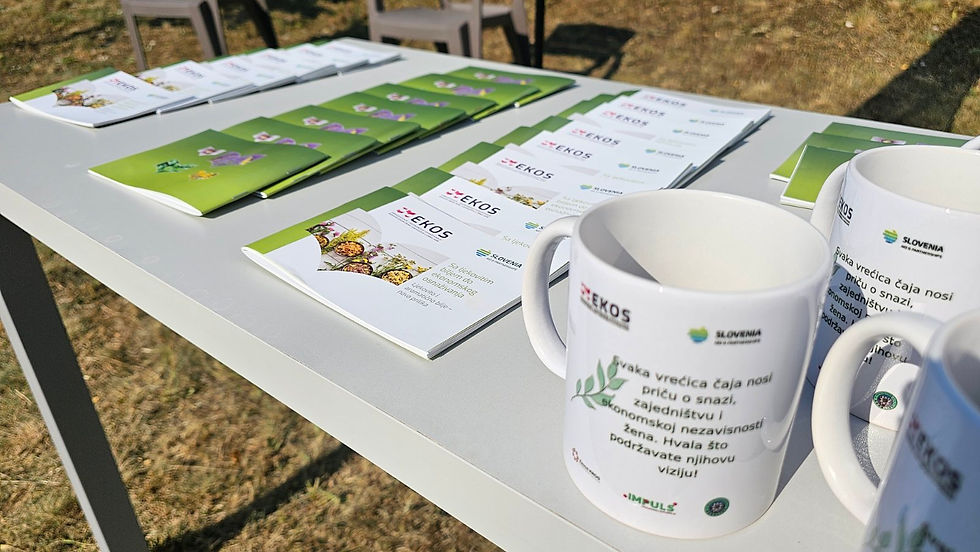Launch of the "Youth Travel Sustainably" project
- Zavod Krog

- Feb 29, 2024
- 3 min read
The Mediterranean is one of the world's leading tourist destinations. Tourism has been in decline due to increasing competition, the deterioration of the political and security situation and the Covid-19 pandemic, which has made revitalising the sector an economic priority for Mediterranean countries. Unfortunately, tourism in the Mediterranean, particularly in coastal areas, combined with the effects of climate change, is having a negative impact on the landscape, soil and coastal erosion, water resources, flora and fauna, increasing waste and pollution in the sea. Tourism puts pressure on natural and local resources, water, energy, local produce, has a significant impact on local populations, ecosystems, traditional ways of life and cultural heritage are under threat.
The slowdown in tourism was therefore also an opportunity to transform the tourism model into a more sustainable one in which young people play an important role. Sustainable tourism is a response to the dangers of mass and conventional tourism. It reduces negative impacts on nature and society and balances the needs of visitors and the host country. By managing all resources in a way that meets economic, social, environmental and spiritual needs, it leads to the protection and enhancement of opportunities for future development. More and more tourism organisations and agencies are focusing their strategies on tourism that is friendly to the local and global environment and its people and culture. In order to take advantage of these sustainable tourism opportunities, young people wishing to work in tourism should be provided with training on sustainable practices in tourism, sustainable destinations, green aspects of tourism, the importance of working with local communities, which will help them in the long term to find employment in the tourism sector.
This is why the "Youth travel Sustainably" project, financed by the Erasmus+ program of the European Union, brings together organisations from Slovenia, Lebanon, Egypt, Tunisia and Turkey. In most of these countries tourism accounts for more than 10-15% of their total GDP. In these countries, there are numerous high schools dedicated to tourism and hospitality, thousands of young people studying tourism and aspiring to work in the sector in the future. However, schools usually do not give them enough knowledge about the importance of sustainable development and sustainable tourism, let alone the entrepreneurial and employability skills such as creativity, teamwork, problem-solving, project planning and management, etc., which are needed in today's professional life, including in the tourism sector. The project therefore aims to educate more than 30 young people from the above-mentioned countries about sustainable development in general and sustainable tourism in particular, and to strengthen their entrepreneurial skills, which will be useful for them when thinking and planning projects in the field of sustainable tourism. The aim is to improve their employability skills and increase their job prospects, especially in the field of sustainable tourism. In the long term, the project aims not only to increase the employment of young people in the field of sustainable tourism, but also to develop and promote sustainable tourism products and services designed and proposed by the young people involved.
Several activities will be carried out during the project, which will be interlinked. First, young people from the partner countries will take part in a 7-day exchange in Izmir, Turkey. During the exchange, training in sustainable development will be provided, with a focus on sustainable tourism and entrepreneurship in sustainable tourism. During the exchange, young people will acquire knowledge and skills in these areas and, with the support of mentors, will design business plans for their sustainable tourism projects. The exchange will also provide them with financial project management skills and employability skills such as teamwork, creativity, communication, etc. The exchange will also organise several visits to sustainable tourism projects already operating in the Izmir area. After returning from the exchange, the young people will finalise their business plans in their home countries with the support of mentors and organisations, establish contacts with other tourism actors and stakeholders in their communities, try to test their ideas among the local community and tourists, etc.
In the second part of the project, the same young people will meet for a second exchange in Tunisia, where they will present and test their plans to young people from other countries. The young people will help each other and advise each other on how to improve or build on their projects. This exchange will also introduce young people to the possibilities of financing their projects, obtaining grants, loans or other support. The exchange will also include a workshop on the promotion of their tourism projects and on cooperation and networking with different stakeholders and actors in the field of tourism.










Comments